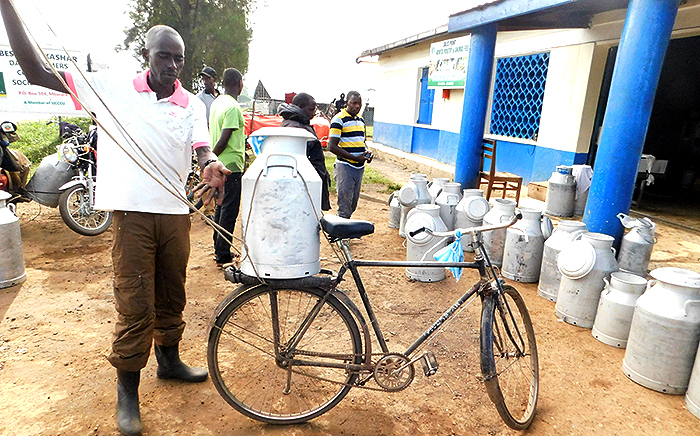Milk Cooler poses health risk to people of Mbarara
Jun 01, 2018
Despite the good services it renders to the public, AKCFC's milk cooler machine poses a great health risk to the society it serves if not cleaned properly.

PIC: A staff member climbing the cooler to clean it manually. (Credit: Titus Kakembo)
FARMING
MBARARA - Besides the fluctuating milk prices during the time when the dairies are flooded with milk, the cooler serving Abesigana Kashari Dairy Farmers Cooperative (AKCFC) in Biharwe, Mbarara has a technical problem.
Without AKCFC, Mbarara's economy, as well as the could be partially crippled. (Or supply of diary products)
The co-operative is one of the many that is found in the different districts of the country.
It collects over 10,000 litres of milk from the farmers every day which it supplies to locals, different diaries and manufacturers of diary products.
However, despite the good services it renders to the public, AKCFC's milk cooler machine poses a great health risk to the society it serves if not cleaned properly.
"The machine cannot clean itself anymore," lamented the in charge animal husbandry Douglas Bagumya. "Staff have to climb in and do it manually. It is a dangerous job but it has to be done if the milk is to retain its purity."
Asked weather all coolers have automatic cleaning facilities, Bagumya revealed that in the food chain industry, maintaining a clean and tidy storage is very important.
"Other machines are cleaned manually but this modern one was designed to clean it self.
"The rules are that, the person who goes in the unit is free from any contamination or it puts consumers of our milk at a health risk."
An assistant manager, Benjamin Mugumya says they do not have knowledge of how to repair the cooler.
AKCFC, with a membership 154 farmers has transformed lives as herders are stocking hybrid cows instead of the traditional long horned Ankole species.
The standards and quality of milk have followed suit as many are now profit propelled.
"To meet the required market standards, the installing of two cooling systems with the help of the Danish Embassy, through Agriculture Business Initiative (aBi) and Uganda Crane Creameries was inevitable," adds Bagumya. "Consequently many benefactors are quitting their pastoral way of life."
Pastoralism is being replaced by grazing cattle on a farm for beef and milk.
The volume and quality of dairy products have since improved. Post harvest is evidently better.
At the center where farmers deliver their product, they risk rejection if it has water and fails the laboratory ethanol test and the Lacto Scan.

A milk man delivers milk to thre dairy. Delivery of milk ranges between 50 -300 litres by an individual farmer per day. (Credit: Titus Kakembo)
Milk delivered in jerry cans is also not accepted.
The AKCFC has been instrumental in the booming milk production by offering farmers loans of up to sh10m.
There is a veterinary shop that salvages farmers from being fleeced by counterfeits in the market.
"These can be paid back cash or in form of milk delivery which costs between sh700-sh1200 per liter," confides a benefactor John Tumuhaise from Kakome. "We supply between 50-400 liters of milk per day.
Reception of milk closes at 11:00am in the morning. At 3:00pm more milk, got in the afternoon, is delivered. It is then chilled up to 4 degrees."
